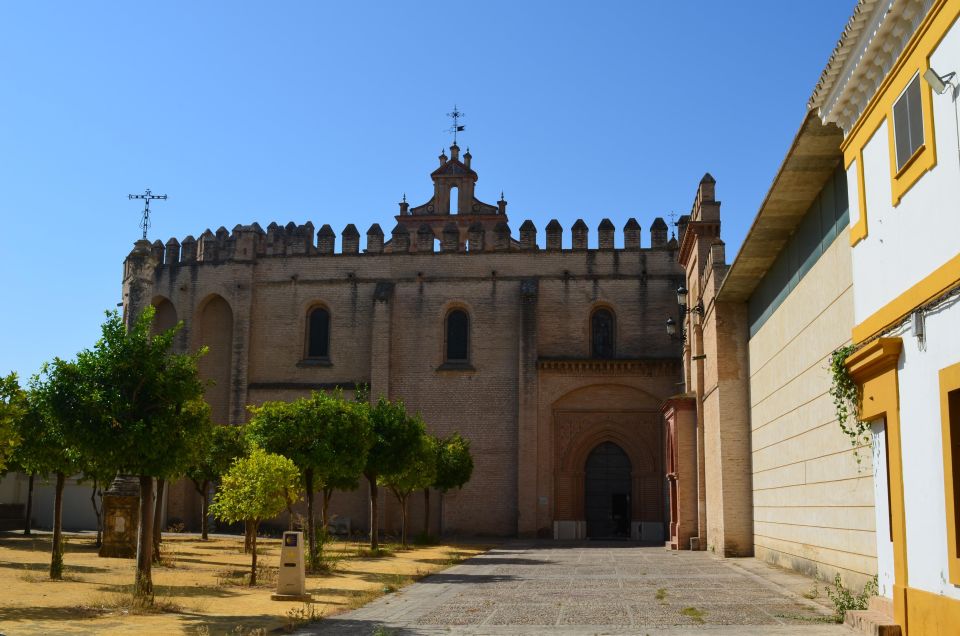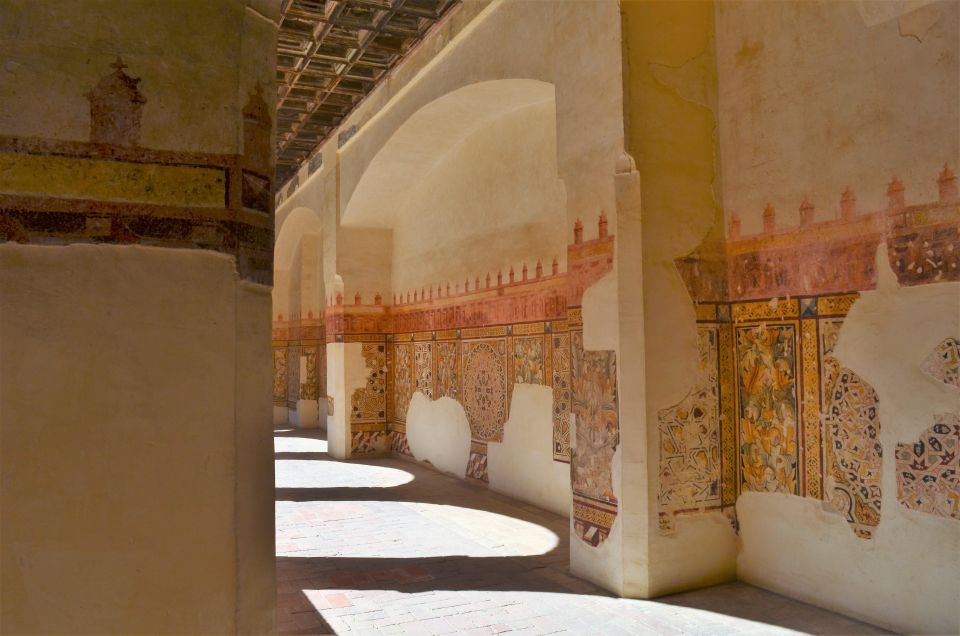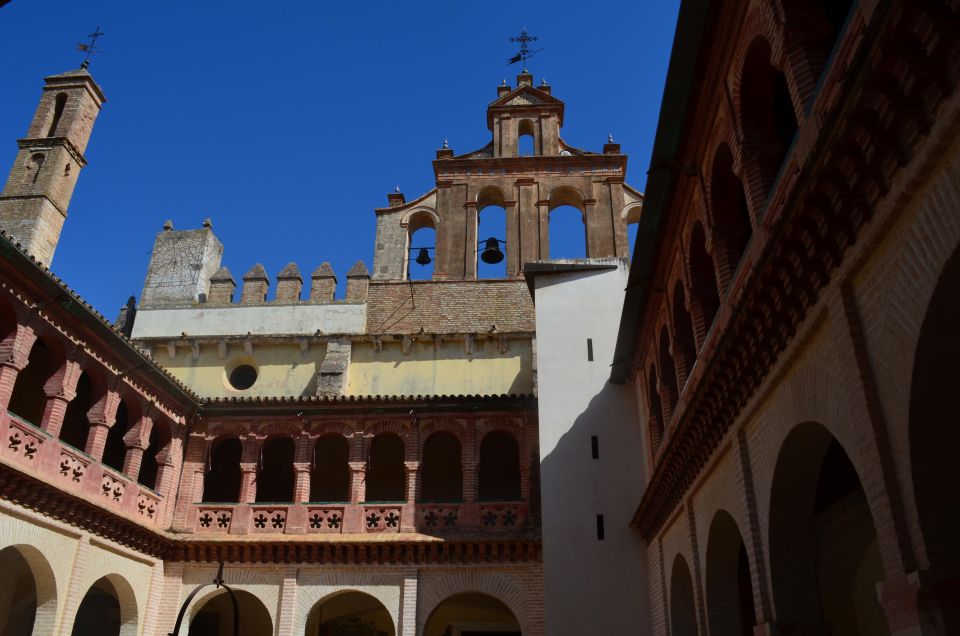The San Isidoro Del Campo Monastery in Santiponce near Seville boasts a rich history and cultural significance. Founded in 1301 as a family pantheon, the monastery has transitioned through various religious orders, leaving an indelible mark on its architectural and artistic elements. Visitors can explore the stunning altarpiece by Martínez Montañés and enjoy the monastery’s profound past during guided tours. Whether one’s interest lies in history, art, or spirituality, this landmark offers a captivating experience that’s sure to leave a lasting impression.
Good To Know

- The San Isidoro Del Campo Monastery is the site of the first Bible translated into Spanish and the final resting place of the Guzmán family.
- The monastery transitioned from a family pantheon to a Cistercian monastery and later the Jerónimos order, reflecting religious and political changes.
- The monastery played a significant role in Protestantism, as its monks faced persecution for translating forbidden texts.
- The monastery’s artistic highlights include the altarpiece by Martínez Montañés and architectural features blending Gothic and Renaissance styles.
- The monastery is conveniently located in Santiponce, just a short drive from Seville, and is accessible by car, public transportation, and walking.
It's also worth checking out some other tours and experiences nearby.
Overview of the Monastery

The San Isidoro del Campo Monastery is a medieval jewel steeped in significant historical importance.
It’s the site of the first Bible translated into Spanish, and the final resting place of the Guzmán family, founded by Guzmán El Bueno in 1301.
This monastery has evolved over time, transitioning from a family pantheon to a home for Cistercian monks and later Jerónimos.
It’s an important site for Protestantism as well, with monks persecuted for reading and translating forbidden texts.
The monastery’s artistic features include notable works like the altarpiece by Martínez Montañés, considered a peak work.
Tour Information

Offered at the San Isidoro del Campo Monastery, the guided tour lasts approximately 1.5 hours and is conducted in Spanish.
The tour is wheelchair accessible, making it inclusive for all visitors. Guests can take advantage of flexible booking options, including free cancellation up to 24 hours in advance and a reserve now, pay later option.
This allows for convenient planning and peace of mind. The tour provides cultural insights, historical stories, and an appreciation of the monastery’s impressive artworks, offering a comprehensive and enriching experience for those interested in this medieval jewel.
Historical Background
Originally, the San Isidoro del Campo Monastery had its roots in a legend surrounding a school founded by Saint Isidore and a Mozarabic hermitage.
Over time, it transitioned from a family pantheon to a Cistercian monastery and then to a Jerónimos order.
This historic site held significant importance for Protestantism, as the monks were persecuted for reading and translating forbidden texts.
The monastery’s role evolved through the centuries, reflecting the religious and political changes that shaped the region.
Artistic Highlights
Decorated by the Jerónimos order after the Cistercian monks, the San Isidoro del Campo Monastery is known for its austere yet remarkable artwork. The monastery’s most notable work is the altarpiece by the renowned Spanish sculptor Martínez Montañés, which is considered a peak of his artistic achievement. Beyond the altarpiece, the monastery features a variety of artistic elements that showcase the skills of its creators:
| Artistic Features | Description |
|---|---|
| Architectural Design | Harmonious blend of Gothic and Renaissance styles |
| Stained Glass Windows | Intricate designs depicting religious scenes |
| Carved Choir Stalls | Ornate woodwork with religious imagery |
| Painted Ceilings | Vibrant frescoes depicting biblical narratives |
| Sculpture Collection | Impressive religious statues and figurines |
Visitor Experience
The San Isidoro del Campo Monastery welcomes visitors to experience its captivating history and remarkable art first-hand.
The guided tour begins at the Patio de los Naranjos, the monastery’s entrance. Highlights of the 1.5-hour experience include:
- Cultural insights and stories of the site’s historical figures
- Appreciation of the stunning altarpiece by Martínez Montañés
- Convenient booking options, including a reserve now and pay later option and free cancellation up to 24 hours in advance
The monastery’s wheelchair accessibility and engaging tour ensure a memorable visit for all who step through its doors.
Significance of the Monastery
The San Isidoro del Campo Monastery boasts a rich historical significance, rooted in its evolution from a family pantheon to a center of Protestantism.
Legends suggest it was founded as a Mozarabic hermitage and school by Saint Isidore himself. The monastery later transitioned to serve as the final resting place of the Guzmán family before becoming a Cistercian and then Jerónimos abbey.
This shift in purpose reflects the monastery’s importance as a site of religious and cultural significance. Notably, the monastery became a hub for Protestant activities, leading to the persecution of its monks for reading and translating forbidden texts.
The monastery’s multifaceted history underscores its enduring legacy as a medieval jewel.
Getting to the Monastery
Reaching the San Isidoro del Campo Monastery is straightforward, as it’s conveniently located in the town of Santiponce, just a short drive from Seville.
The monastery can be accessed:
- By car, with ample parking available on-site
- By public transportation, with regular bus services connecting Seville and Santiponce
- On foot, as the monastery is within walking distance from the city center
Once at the monastery, visitors will find themselves at the Patio de los Naranjos, the designated meeting point for guided tours.
From here, the tour commences, providing an immersive exploration of the monastery’s rich history and architectural marvels.
Here's a few more nearby tours and experiences we think you'll like.
- Alcazar of Seville Reduced-Group Tour
- Flamenco Show at Tablao El Arenal With Drink and Optional Dinner or Tapas
- Flamenco Show at Casa De La Memoria Admission Ticket
- Seville: Traditional Flamenco & Tapas Evening Tour
- Cathedral, Alcazar and Giralda Guided Tour With Priority Tickets
- Cordoba & Carmona With Mezquita, Synagoge & Patios From Seville
Frequently Asked Questions
What Are the Opening Hours of the Monastery?
The monastery’s opening hours are not explicitly mentioned in the provided information. The details focus on the tour duration, accessibility, and booking options, without specifying the general operating hours of the monastery.
Is There a Dress Code for Visitors?
There is no specific dress code enforced at this site. Visitors are advised to wear comfortable, weather-appropriate attire to ensure a pleasant and unimpeded exploration of the historical and artistic features of the monastery.
Are There Any Group Discounts Available?
The monastery offers group discounts, typically around 10% off the regular ticket price for groups of 10 or more. Guests should inquire about availability and details when booking their visit.
Can Visitors Take Photos Inside the Monastery?
Yes, visitors are generally allowed to take photos inside the monastery, though flash photography may be prohibited to preserve the artwork and historic ambiance. Check with tour staff for any specific photo policies.
Is There a Gift Shop On-Site?
Yes, the San Isidoro del Campo Monastery has a gift shop on-site where visitors can purchase souvenirs and religious items related to the monastery’s history and art.
Not for you? Here's more of our most recent tour reviews happening neaby
- Seville: Ticket to Flamenco Show at La Casa De La Guitarra
- Seville: Palace of the Duchess Entry Ticket and Guided Tour
- Seville: All Day Bike Rental
- Seville: Electric Scooter City Tour
- Seville: Stand Up Paddle Board Rental
- Seville: Flamenco Show at Tablao Los Gallos
- Seville: Guadalquivir River Kayaking Trip
- Seville: Self-Guided Audio Walking Tour
- Sherry Wine Tasting With Views of Sevilla
- Seville: Small-Group Jewish Quarter Discovery Walking Tour
- Seville: Barrio De Santa Cruz Small Group Walking Tour
- Bike Rental 1 Day
- Seville: Flamenco Show With Optional Flamenco Museum Ticket
- Seville: Guadalquivir & Secrets of Triana Small Group Tour
- Seville: 1-Hour Walking Tour Barrio De Santa Cruz
The Sum Up
The San Isidoro del Campo Monastery is a captivating historical and artistic gem near Seville. Visitors can explore its rich heritage, from its origins as a family pantheon to its role as a hub for religious orders. The monastery’s stunning features, including an altarpiece by Martínez Montañés, offer an immersive experience that showcases its profound significance in Spain’s cultural landscape.
